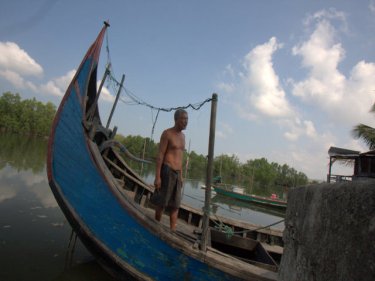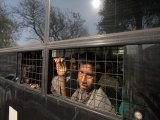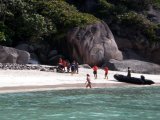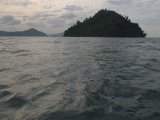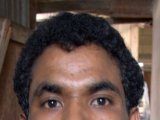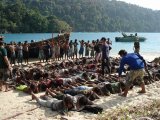PHUKET: Two more boats laden with would-be refugees are at sea off the Phuket-Andaman coast, sources say, as the tourism high season merges with the safe ''sailing season'' for boatpeople.
The new sightings bring to five the number of Rohingya vessels spotted or intercepted off Thailand's coast in the past two weeks, an indication that informed sources are correct in predicting that scores of boats are likely to sail as tranquil seasonal conditions set in.
The sequence of sailings is likely to focus international attention again on the plight of the Rohingya, a Muslim minority group deprived of citizenship and all other basic human rights in Burma.
''These people are prepared to risk their lives in long, perilous sea voyages because conditions are so bad where they live in Burma's north, or across the border as outcasts in Bangladesh,'' a source who did not wish to be named told Phuketwan.
The epic flight from persecution under Burma's rulers comes as the military junta and a newly elected Parliament seek the country's controversial ascension to the chair of the important regional Asean group in 2014.
The word ''Rohingya'' appears to be seldom used in communications among Asean countries and neighbors, including India. These days, the boatpeople constantly face additional hardships if they declare their ethnicity in all countries in which they are forced ashore.
Phuketwan has been told but has yet to independently confirm that two of the five recent boats that set sail from northern Burma or Bangladesh have now landed in Malaysia.
It is believed that one boat, containing 70 men and boys, sailed on October 24. The second boat, which sailed on October 25, had 79 people on board. The whereabouts of a third boat, which sailed on October 16, is not known.
All three boats were intercepted by Royal Thai Navy vessels off the Andaman coast around Phuket and ''helped on.''
This is the phrase used to describe the policy that superceded the notorious ''push-backs'' of the 2008-2009 sailing season, when the Thai military and paramilitaries towed Rohingya out to sea and cut them adrift in international waters.
Several hundred men and boys are believed to have perished before survivors reached Indonesia or India's Andaman and Nicobar Islands. ''Pushbacks'' ceased once the secret policy was exposed by Phuketwan journalists and the South China Morning Post newspaper in Hong Kong.
The Royal Thai Navy now ''helps on'' would-be refugees by intrercepting boats at sea and providing food, fuel and medical attention if required so the Rohingya can sail on to their preferred destination, which is often Malaysia.
While the interception of three boats can be confirmed, it is not known whether the two freshly-sighted boats have been apprehended and ''helped on.'' The vessels are believed to have sailed on November 4 and November 5.
People smugglers - described appropriately in Hong Kong parlance as ''snakeheads'' - have been selling tickets on an increasing number of vessels this sailing season as the Rohingya perceive no change in their tormented lives.
Mostly, the vessels are rickety and have no navigation equipment so the men and boys are forced to hug the coast, only coming ashore when they run out of food and water.
In many cases, they do not know whether they are landing in Thailand or Malaysia. Culturally, the Rohingya protect their womenfolk and would never consider putting their lives at risk.
A boatload of almost 70 men and boys that landed on a small beach on Phuket alongside a five-star resort in January highlighted the remarkable incongruity of the world's most deprived ethnic group fetching up in a holiday haven for the world's rich.
Subsisting on a few handfuls of reconstituted rice each day, the Rohingya seek salvation by plying the same waters as speedboats ferrying snorkelling day-trippers, game fishing boats and divers leading the good life on ''live-aboard'' adventures.
Shocking photographs published in 2009 showed the contrast when tourists, frolicking in the Similan islands off Phuket, took snapshots of apprehended Rohingya, emaciated and burned almost black, laid out in rows on sand under the gun at the other end of the beach.
It was the large number of close to 5000 Rohingya who stumbled ashore in Thailand in 2007-2008 that led to the Thai government of the time formulating the reprehensible ''pushbacks'' policy.
Yet for Thailand and all the nations of the region, the issue of what to do with the boatpeople is not likely to vanish at sea anytime soon.
Rohingya pose an uneasy Asean quandary because the new and supposedly benign rulers of Burma still refuse to accept the Rohingya as citizens,although they have made the Arakan region their home for as long as 400 years.
Even the BBC was recently embroiled in controversy over a year-old map depicting the Rohingya as being one of the many ethnic communities that constitute 21st century Burma.
While some tribes are accepted, Burma shows no sign of budging. Not one of the supposedly more compassionate and better-informed countries in Asean speaks out.
So in increasing numbers now, the boats will come. Desperation will continue to force the Rohingya, blanked out of the region's collective memory, to sail across the waters off Phuket and its other-world to their uncharted fate.
The new sightings bring to five the number of Rohingya vessels spotted or intercepted off Thailand's coast in the past two weeks, an indication that informed sources are correct in predicting that scores of boats are likely to sail as tranquil seasonal conditions set in.
The sequence of sailings is likely to focus international attention again on the plight of the Rohingya, a Muslim minority group deprived of citizenship and all other basic human rights in Burma.
''These people are prepared to risk their lives in long, perilous sea voyages because conditions are so bad where they live in Burma's north, or across the border as outcasts in Bangladesh,'' a source who did not wish to be named told Phuketwan.
The epic flight from persecution under Burma's rulers comes as the military junta and a newly elected Parliament seek the country's controversial ascension to the chair of the important regional Asean group in 2014.
The word ''Rohingya'' appears to be seldom used in communications among Asean countries and neighbors, including India. These days, the boatpeople constantly face additional hardships if they declare their ethnicity in all countries in which they are forced ashore.
Phuketwan has been told but has yet to independently confirm that two of the five recent boats that set sail from northern Burma or Bangladesh have now landed in Malaysia.
It is believed that one boat, containing 70 men and boys, sailed on October 24. The second boat, which sailed on October 25, had 79 people on board. The whereabouts of a third boat, which sailed on October 16, is not known.
All three boats were intercepted by Royal Thai Navy vessels off the Andaman coast around Phuket and ''helped on.''
This is the phrase used to describe the policy that superceded the notorious ''push-backs'' of the 2008-2009 sailing season, when the Thai military and paramilitaries towed Rohingya out to sea and cut them adrift in international waters.
Several hundred men and boys are believed to have perished before survivors reached Indonesia or India's Andaman and Nicobar Islands. ''Pushbacks'' ceased once the secret policy was exposed by Phuketwan journalists and the South China Morning Post newspaper in Hong Kong.
The Royal Thai Navy now ''helps on'' would-be refugees by intrercepting boats at sea and providing food, fuel and medical attention if required so the Rohingya can sail on to their preferred destination, which is often Malaysia.
While the interception of three boats can be confirmed, it is not known whether the two freshly-sighted boats have been apprehended and ''helped on.'' The vessels are believed to have sailed on November 4 and November 5.
People smugglers - described appropriately in Hong Kong parlance as ''snakeheads'' - have been selling tickets on an increasing number of vessels this sailing season as the Rohingya perceive no change in their tormented lives.
Mostly, the vessels are rickety and have no navigation equipment so the men and boys are forced to hug the coast, only coming ashore when they run out of food and water.
In many cases, they do not know whether they are landing in Thailand or Malaysia. Culturally, the Rohingya protect their womenfolk and would never consider putting their lives at risk.
A boatload of almost 70 men and boys that landed on a small beach on Phuket alongside a five-star resort in January highlighted the remarkable incongruity of the world's most deprived ethnic group fetching up in a holiday haven for the world's rich.
Subsisting on a few handfuls of reconstituted rice each day, the Rohingya seek salvation by plying the same waters as speedboats ferrying snorkelling day-trippers, game fishing boats and divers leading the good life on ''live-aboard'' adventures.
Shocking photographs published in 2009 showed the contrast when tourists, frolicking in the Similan islands off Phuket, took snapshots of apprehended Rohingya, emaciated and burned almost black, laid out in rows on sand under the gun at the other end of the beach.
It was the large number of close to 5000 Rohingya who stumbled ashore in Thailand in 2007-2008 that led to the Thai government of the time formulating the reprehensible ''pushbacks'' policy.
Yet for Thailand and all the nations of the region, the issue of what to do with the boatpeople is not likely to vanish at sea anytime soon.
Rohingya pose an uneasy Asean quandary because the new and supposedly benign rulers of Burma still refuse to accept the Rohingya as citizens,although they have made the Arakan region their home for as long as 400 years.
Even the BBC was recently embroiled in controversy over a year-old map depicting the Rohingya as being one of the many ethnic communities that constitute 21st century Burma.
While some tribes are accepted, Burma shows no sign of budging. Not one of the supposedly more compassionate and better-informed countries in Asean speaks out.
So in increasing numbers now, the boats will come. Desperation will continue to force the Rohingya, blanked out of the region's collective memory, to sail across the waters off Phuket and its other-world to their uncharted fate.

